Listen:
Scroll down for a transcript, video, how to subscribe, and more
Episode Synopsis:
Welcome to Episode #73 of Habitual Excellence, presented by Value Capture.
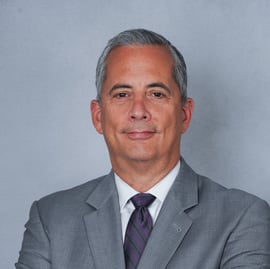 Joining us today as our guest is Louis (Lou) A. Shapiro. He is the President and Chief Executive Officer of the Hospital for Special Surgery HSS. He has served in this role since October 2006.
Joining us today as our guest is Louis (Lou) A. Shapiro. He is the President and Chief Executive Officer of the Hospital for Special Surgery HSS. He has served in this role since October 2006.
Under Lou’s leadership, HSS has experienced significant growth, expansion of facilities and recognition as the world leader in its specialty areas of orthopedics, rheumatology and their related disciplines.
Lou has more than 30 years of healthcare experience, including as Executive Vice President and Chief Operating Officer of Geisinger Health System in Pennsylvania, and as a leader in the healthcare practice at McKinsey & Company. He began his career at Allegheny General Hospital in Pittsburgh, where he served in a number of capacities.
Today we’re going to be talking about how the culture at HSS contributes to their habitual excellence, including 13 years being ranked #1 at what they do as a specialty hospital for musculoskeletal care. What's the role of hiring the best of the best and how does their culture help them thrive and stay? What can be learned from the HSS approach that delivers such great value, including incredibly low infection rates?
In today's episode, Lou talks with host Mark Graban, about topics and questions including:
- Patients being willing to travel to HSS for better care and service (Net Promoter Score of 94)
- HSS will be celebrating its 160th year anniversary
- Do other organizations who are losing patients to HSS look to them for how to improve and compete?
- Why Lou doesn't compare HSS to anybody else
- Sharing data transparently
- Culture as strategy
- Would the HSS management model and culture translate to a general hospital or system?
- Commitment to culture on top of hiring the very best (and keeping them)
- Breaking down tradeoffs: better flow, faster care can also be more caring care, higher quality care, safer care
- Comparing costs - not just per episode, but across the continuum including conservative care
- The importance of not becoming a commodity
- Being visible and accessible as a leader
- "Excellence" as one of the values of the organization and realizing you're not perfect
- Aiming for and wanting ZERO injuries, infections, complications and ZERO dissatisfied patients
Episode Video:
Here's a great clip about aiming for ZERO:
Quotes:
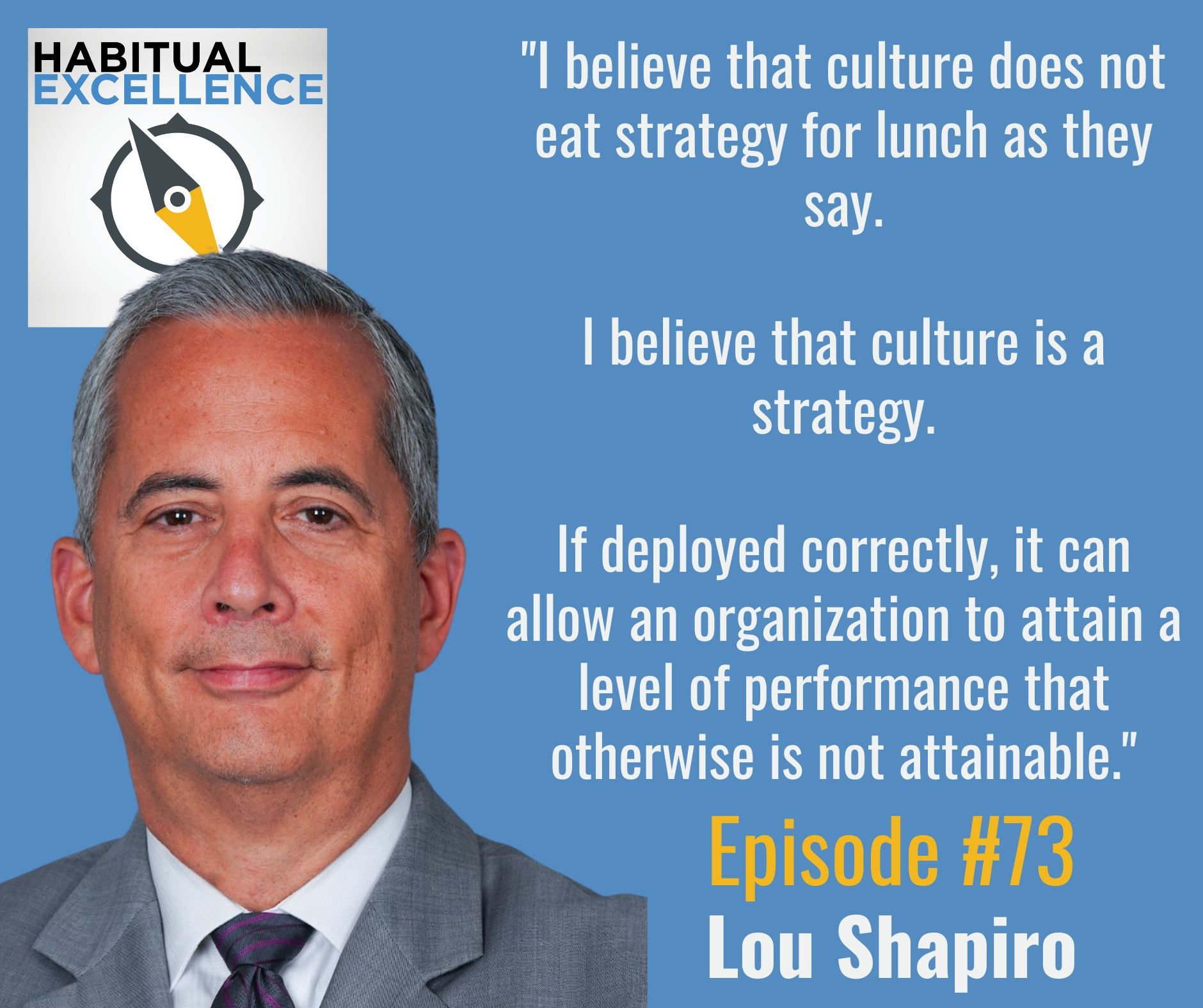
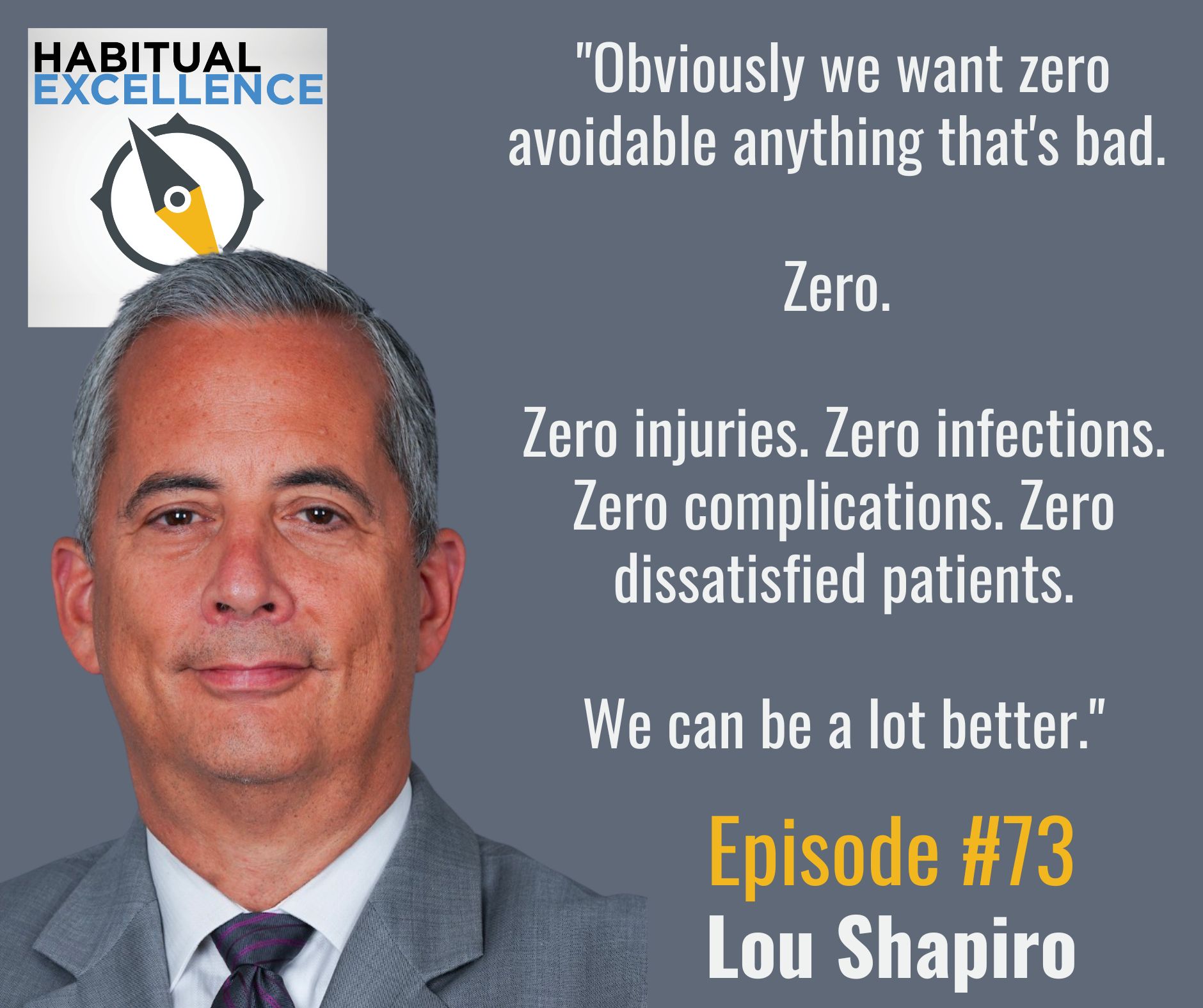
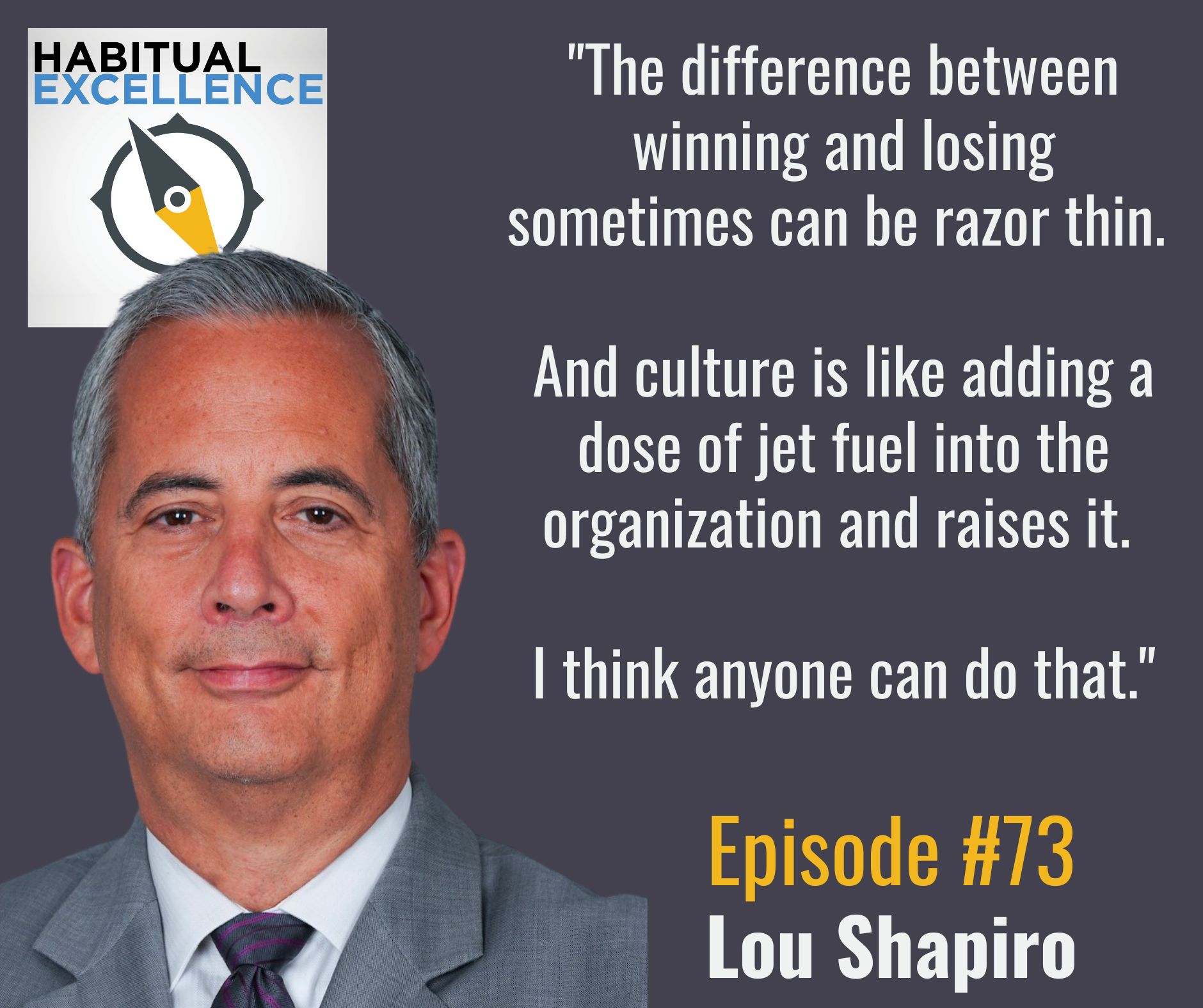
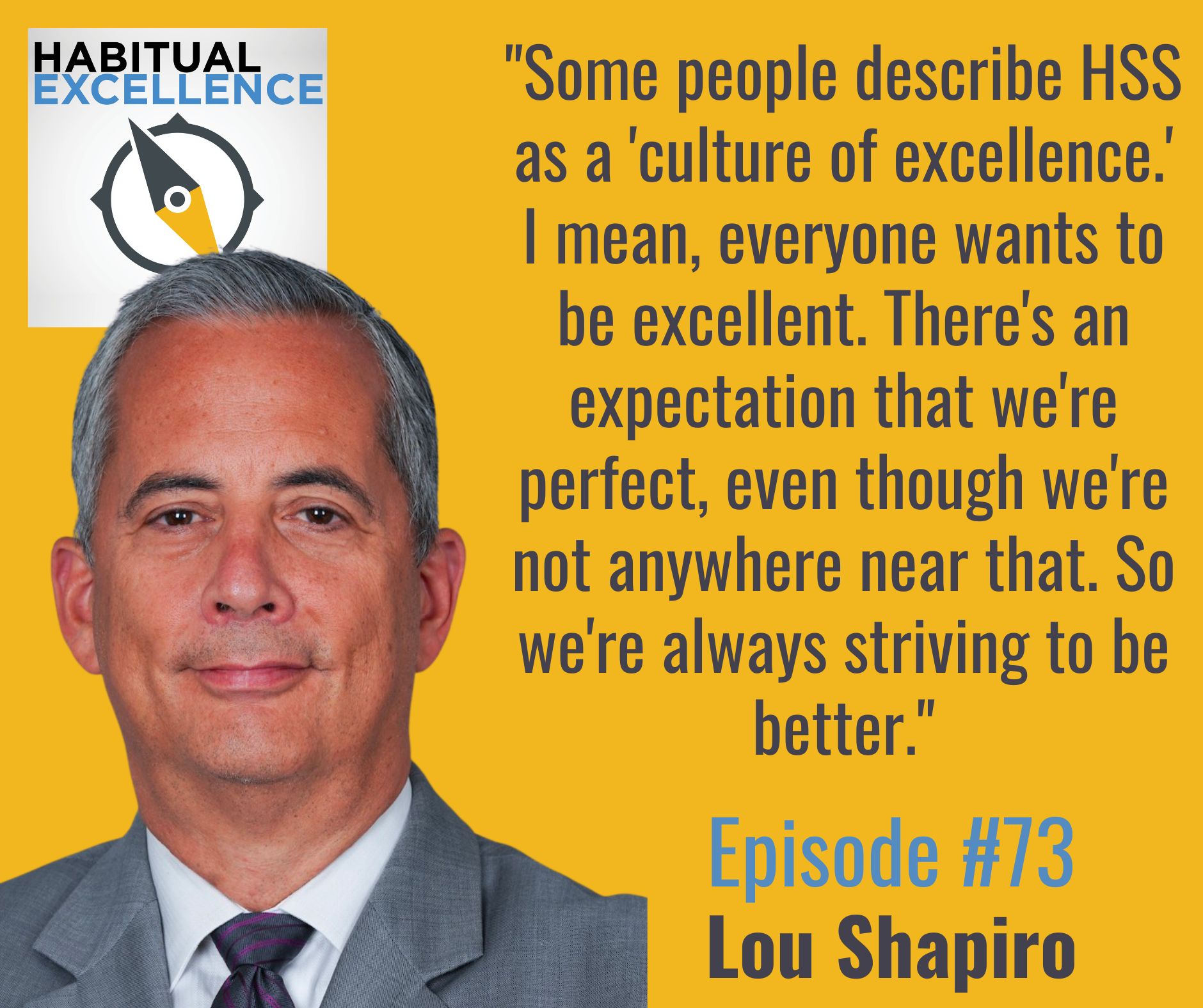
Subscribe:
To make sure you don't miss an episode, be sure to subscribe today! Please rate and review the podcast.
Automated Transcript:
Mark Graban (2s):
Welcome to Habitual Excellence, presented by Value Capture. This podcast in our firm is all about helping you and your organization achieve habitual excellence via one unifying focus, one value based structure in one performance system. In other words, it's about helping you capture dramatically more value through achieving perfect care and perfect safety for patients and staff. To learn more about Value Capture in our services, visit www.valuecapturellc.com. Hi everybody. Welcome back to Habitual Excellence, I'm Mark Graban. Our guest today is Lou Shapiro. He is the president and CEO of the Hospital for Special Surgery or HSS.
Mark Graban (46s):
He served in this role since October, 2006, and under his leadership, HSS has experienced significant growth and expansion of facilities and recognition as the world leader in its specialty, areas of orthopedics, rheumatology, and related disciplines. So we'll have a chance to, to learn more of the, the how and the, the why from Lou today. He has more than 30 years of healthcare experience. He has been executive vice president and Chief Operating Officer of Geisinger Health System in Pennsylvania, and he was a leader in the healthcare practice at McKinsey and Company. He began his career at Allegheny General Hospital in Pittsburgh, where he served in a number of capacities. So Lou, welcome to the podcast, and you, you share some Pittsburgh roots with most of the team at Value Capture, it seems.
Lou Shapiro (1m 30s):
Yeah, that's, that's my hometown, for sure.
Mark Graban (1m 35s):
Hometown University. Start of your career.
Lou Shapiro (1m 39s):
Yeah. I mean, I, I mean, I, I, I, I wasn't born there. I was born in Ohio, but I grew up in Pittsburgh and, you know, worked there up until about, you know, 20 years ago. So, you know, all schools, high school, undergraduate, graduate, First job, second job, third job. Yeah. Until, until until I moved, started moving east.
Mark Graban (2m 5s):
Yes. And HSS is completely located now within you in New York City is where, where you've been for a while now.
Lou Shapiro (2m 13s):
Yeah, HSS as, as I think you described, HSS is a academic medical center that's focused on, you know, one area of healthcare. Our area is Musco, skeletal health, which is orthopedics here. It includes rheumatology and all the related fields of medicine that support that. And we're independent. We're not part of any other system. And our core markets are New York, New Jersey, Connecticut, Florida. So we're physically in four states.
Lou Shapiro (2m 53s):
We serve patients from all 50 states. Pre, pre pandemics serve patients from all 50 states and about about 80 countries each year. And that part of our business is you probably 75% back in growth.
Mark Graban (3m 9s):
Yeah, yeah. So people being willing to travel to HSS, I mean that, can you walk us through how that comes to be in terms of results leading to reputation, leading to people being willing to leave their local area for certain procedures?
Lou Shapiro (3m 27s):
Yeah, so healthcare is local to avail themselves of the best healthcare they can. And you know, ideally you don't want to travel far to get it because it's complicated and it's, you know, it's hard. It's hard when you're not feeling the way you need to be feeling. On the, on the other hand, in some circumstances, if you want what you perceive to be the very best, there has to be enough of a distinction where you're willing to, you know, go to greater lengths to receive it.
Lou Shapiro (4m 17s):
Yeah. And you know, HSS, this coming May HSS will be celebrating its 160th year anniversary of our, of our founding. And for that entire 160 years, we've been focused on musculoskeletal health and have just been, you know, focused on that. And when I say academic medical center, that means patient care, teaching and research. And if you're an academic medical center, you need to attract the kinds of talent that wanna be in an academic medical center environment, always sort of pushing the envelope.
Lou Shapiro (4m 59s):
And we've built this, this has been built over the course of time and you know, for a long, for a very significant part of our history. HSS was small, it really only started growing in the mid nineties. And, you know, we're to the point now where we're, you know, about a $2 billion revenue organization, which is, you know, it's just a number, but it does indicate some, some scale. And you know, as a consequence of our focus, do we have the privilege of only focusing on one part of healthcare? We don't have to worry about the other 20 or 30 parts that a general hospital or a more diversified health system would have.
Lou Shapiro (5m 42s):
So, you know, pretty focused doing it for a long time. Talented people, culture systems, everything geared towards this patient population from health and wellness to making sure that the care that's provided when they have a problem is at the top. And then what they need after we've just gotten pretty good at it and have earned the reputation through our results. So people make informed decisions about wanting to come here. And, you know, even in our core market, every single person that's treated here receives all of their other healthcare needs that aren't mus skeletal in another health system that also does what we do.
Lou Shapiro (6m 36s):
A hundred percent, a hundred percent. 90%. See, alright, I got a problem, I wanna go to the best pick HSS, whether they live in Manhattan or California or you know, wherever they may come from in another country.
Mark Graban (6m 58s):
And so, we'll, we'll have a chance to take a deeper dive into some of the methods, like I said, around process and culture. You know, on the HSS website when you, there's a page about results and it doesn't just share great results, it starts to break down, you know, kinda at a high level, well here's how we do it. So I guess, you know, one question for you would be, how much does this competition now of, let's say, you know, a local health system is losing some number of patients to you, do they make excuses for that? Do they, let's start looking to organizations like yours. Like does that new, does that competition drive others to get better?
Mark Graban (7m 38s):
Are you seeing much of that, or what would you suspect is happening?
Lou Shapiro (7m 43s):
Oh, I, I, I think that every health system is trying to get better. I don't really, you know, compare ourselves to anyone else. I try to compare our performance to what it was and make sure it's getting better. But I think you see that in the data. There's not a health system out there, I don't think, that's not trying to get better at everything they do. And every health system wants to take care of as much of their patient population's needs as possible and wants to attract as much market share as they can.
Lou Shapiro (8m 27s):
And you know, I sort of feel, and you know, obviously there's a lot of new value based models of carry delivery bundles, narrow networks, all those kinds of things. That's sort of forcing people in one way or another, either forcing them into direction of, that's cuz it's lower cost or forcing them into direction that may be higher quality. Maybe it's a little bit of both. My goal is to, and we may do some of, you know, that kind of stuff as well, but my goal is to provide people with enough information where they can make an informed decision about whether or not they want to come here for care.
Lou Shapiro (9m 10s):
Right. If you have a problem, I don't really care where you go. I just, I don't want you to not come here out of ignorance. I want you to have enough information about our value, our quality, patient experience, outcomes over the cost of care. So you can sign, Yeah, I wanna go to HSS or I wanna go somewhere else.
Mark Graban (9m 37s):
And so when it comes to making that informed decision, it seems like HSS shares quite a bit of data online, whether people go to look for it or not, whether patients even think to go look for it. I mean, it seems to be a fairly common assumption when I think of friends or family who have gotten, let's say, joint replacement surgeries. I I I, I think there's sort of this assumption of like, well everyone's equally good and I like that doctor, so I'll go where the doctor says, Do, do other organizations make as much data available for us to really make a good comparison of let's say postop infection
Lou Shapiro (10m 7s):
Rates? I mean, you know, I don't know. I mean, I'm, I don't, I wouldn't consider myself the student of everyone's data strategy. Sure. But I do, I do know enough and hang around enough with my colleagues that everyone's doing a version of what we're doing, sharing information, helping people make decisions. Outside organizations do the same thing. US News doesn't do what they do so I can advertise for number one, they do what they do to help in very tough consumers, make informed decisions. And there's unlimited number of organizations that are trying to do it.
Lou Shapiro (10m 48s):
The government does that. Proprietary organizations do that. Non-profit organizations do that. Institutions themselves do that. One of the things that we try to do, and we have it on our website and it is modeled after what I think is called the moroni sticker for cars. Right. So you go to, you know, car, it tells you all the stuff you get safety. Yeah. Energy efficiency, the cost, and you can compare A to B to C.
Mark Graban (11m 31s):
It's standardized.
Lou Shapiro (11m 32s):
Yeah. So, so, so we have produced a, a report card, a reliability report card that measures things that should be inputs into your decision that are obviously related and then cost related as well. So if you need, if you need your back fix or your hip replaced, you should be able to say, okay, and go to HSS. And then you try to line up the others and compare the system is not standardized enough, Right.
Lou Shapiro (12m 13s):
For consumers to do it. It's super complicated, right. So the word of mouth is really important. And you know, at some level, at some level, I think one of the, you know, one of the concerns that I have about where the industry is heading is I think it'll be a sad day if too much of healthcare becomes a commodity. Meaning the most convenient and the lowest cost is how decisions are made. And you wanna make sure that quality and outcomes is always front and center. Sure. Because you can always get something cheaper anywhere.
Lou Shapiro (12m 55s):
That doesn't mean that doesn't mean it's better. Yeah. And listen, I think we we're just, we're privileged to be, and it, and it is a function of our history. We're privileged to be able to only have to do one thing. And now we do that, you know, musculoskeletal healthcare is very broad. There's many sub-specialties within there and many, many specialties of medicine that contribute to that. So it's still a lot, but it's just one dimension of healthcare specialization. Specialization does lead to being better.
Mark Graban (13m 41s):
So I was gonna ask you how much of that, Oh, I'm sorry.
Lou Shapiro (13m 45s):
I think
Mark Graban (13m 46s):
You think, well, so I was gonna ask you how much of that is a factor? Like when you look at the success of this, this could be outdated information, but it, the 13 consecutive years of being rated number one in the country for what you do. Is that, is there a 14th year yet, or, or maybe coming?
Lou Shapiro (14m 0s):
Well, that would be next. That would be next year. But yes,
Mark Graban (14m 3s):
13th. Okay. It is 13th. Sometimes these things get a year or something out of date when you, when you find the references to 'em. But when you, when you look at, I mean, to your point, I agree everyone's trying. But when you look at, let's say, you know, your results, low infection rates, low complication rates, at least the latest data I saw, 12 consecutive months without CLABSIs, 12 consecutive months without CAUTIs. Everyone's trying, but not everyone's delivering those results. So there's a couple questions come to mind. One is like, how much of those results are driven by focus? Or if somebody wove a magic wand and suddenly you were a, a big typical independent, general hospital with the same approach to quality and leadership and engaging people drive similar results more broadly.
Mark Graban (14m 47s):
I dunno, that's a thought experiment, but what, what would you expect?
Lou Shapiro (14m 50s):
Well, that's a good question. That would require an experiment to know what would happen. But, but Right. But I would say that every institution has worked hard to get better. Every institution is getting better and there are extraordinary healthcare organizations across the nation that may occupy, you know, positions on, you know, on rankings. So I, I think there, there is, there there is, there is a distinction.
Lou Shapiro (15m 36s):
So I don't think you could replicate it in a general hospital. I think you could in a general hospital, in a general, in a health system that organizes in a unique way for specialization, could probably, could probably get there. Right. I mean, but one of the things that I, you know, I believe is one, you need to recruit talented people. Right. And I can only speak to speak to HSS, not anywhere else. The very best work here. I mean it, you know, it's a talent rich organization.
Lou Shapiro (16m 20s):
Yeah. I have to add, with the exception of some people in, in, in leadership being included. So I weigh the average down. But, you know, it's, you know, it's talent and that's been a historical continuous focus. That doesn't mean there's not talented people, you know, everywhere. I'm just saying it's that the bell-shaped curve here is, you know, way, way on the right side. And, you know, we, we have the, the ability to do that for a lot of reasons related to our history and our academic programs and, and that we have prioritized, kept that at the top.
Lou Shapiro (17m 5s):
The other thing that is distinctive and, and I, I always, I I never want that to sound arrogant, it's just, it's, we focus on ta you know, talent. Yeah. Second thing that I believe that is replicable is a commitment to culture. And I believe that culture does not eat strategy for lunch as they say.
Lou Shapiro (17m 45s):
I believe that. I believe that. What's that? So why is that? Sorry you were
Mark Graban (17m 49s):
About to me and I keep my
Lou Shapiro (17m 50s):
Mistake. That's okay. I believe that culture is a strategy. It doesn't eat strategy. It is a strategy that if deployed correctly can allow an organization to attain a level of performance that otherwise is not attainable. Right. So, you know, creating an environment where everyone who works here, whether they are a nurse, a surgeon, a scientist, a technologist, therapist, work in the back office for billing, environmental services, maintenance, where everyone feels that they are responsible for the organization's success and you have an environment that helps them feel that, that, that allows them to feel that way.
Lou Shapiro (18m 38s):
Right. And if it's not super complicated, it's not rocket science, it's not like doing surgery. You know, there's some basic elements that if you really believe that that is important and you really behave in a way that matches how you think of its importance and it finds its way into the DNA of the organization, it just, it takes you from one notch to the next notch. Sure. Sure. And that is sort of like you, you have footballs on your behind you there, it's like, it's not a game.
Lou Shapiro (19m 19s):
But you know, the, the difference between winning and losing sometimes can be razor thin. Right. And culture is like adding a dose of jet fuel into the organization and raises it. Yeah. I think anyone can do that. I mean, we do it in the middle of one of the most complicated cities from every perspective in the world. So I think, I think anyway, Yeah.
Mark Graban (19m 52s):
Well so we, we, we might agree or tell me if you disagree. So if, if we had two teams, whether football teams or, or hospitals or orthopedic surgery centers with people of the same talent level, the one with the better culture is going to outperform the organization that's more dysfunctional in fighting. There's not alignment, people aren't feeling engaged. I mean, you know, you're, you're, you're being, you know, humble here, Lou, but you know, I'll point out, you know, gallop surveys, employee engagement scores, I lost it on my screen here, but there's been quite a, at least a couple of times where here we go. HS, HSS has gotten the prestigious gallop Great Workplace Award twice for the most engaged workplaces in, in, in the world.
Mark Graban (20m 37s):
So you say everyone can do it, not everybody is what, what are some of the things they should be doing or could be doing to create that engagement and alignment that, that you speak of and you get awards for?
Lou Shapiro (20m 49s):
I mean, look, you, you, you have to decide what's important to you as an organization or as a leader and make sure you're organized to deliver on that importance. Right. You know, I just generally believe that no one needs to come to HSS. No one needs to come here. People come here cuz they choose to come here. Right. So if we're not better then no one knows why would they, why, why would they come here? So I, I feel that, that there's nothing we do, that we do good enough and everything we do, we can be better at it, including our efficiency.
Lou Shapiro (21m 33s):
Right. You know, this is, I don't like to use the word factory cuz it's impersonal, but we are a focused factory who has a net promoter score of 94. Right. Wow. So people feel 94 net promoter score. Yeah. And, you know, everything needs to work together in a, it's high volume, high throughput. I mean, we do 1% of all joint replacements in the United States in this building I'm sitting in right now. Wow. And they're in and out, in and out, in and out. Right. And they feel like they're not on an assembly line.
Lou Shapiro (22m 14s):
They're getting great care, compassionate care, great experience, great outcomes. So if you're not efficient, and especially in this environment that we're in, which is a price constrained inflationary cost environment, right?
Mark Graban (22m 36s):
Yeah.
Lou Shapiro (22m 37s):
Expenses go up, prices don't go up. You need to be efficient. Right. So there can't be any waste in the system. Yeah. Right. Cause waste is wasting money or not the right care or having the patient go or staff go through things that aren't adding value to the outcome. And, you know, you gotta, you gotta do all those things at the same time. Right. And depending on the kind of organization you are, same time serving the community, making yourself accessible, teaching research innovation. But in any of those environments, if you're a healthcare delivery organization, the core is taking care of that patient.
Lou Shapiro (23m 22s):
Cause the patient, that patient only cares about their experience. Right. And their outcomes.
Mark Graban (23m 30s):
Well there, there's, it seems like a similar line in a line of thinking to that the late Paul O'Neill who was, you know, CEO at Alcoa who's been deeply influential to everybody at Value Capture and even back to his days in Alcoa. And then he tried teaching this in healthcare, this idea of breaking down the old assumptions of trade-offs. I started my career in the auto industry and around Detroit it was assumed better quality costs more. And we, and we, I think very often hear people in, in healthcare either saying that or, or taking actions based on that assumption. And, and, and I love how you're pointing out that better flow, faster care can also be more caring care, higher quality care, safer care.
Mark Graban (24m 10s):
Just, I mean, how, how much does just a belief that you can accomplish all those things at the same time. How, how do, how do those goals then influence the organization? Say, okay, yeah, we're, we're, we're gonna work at it, we are gonna deliver all of those results. How, how is, how much of it is the mindset of just saying we're not going to accept those tradeoffs? I should have framed it as better as Oh
Lou Shapiro (24m 30s):
Yeah, yeah, no, I got it. You know, I mean, look, everyone is different. Every organization's different leaders aren't necessarily different. But, you know, I HSS at least modern day didn't decide to be where we are, where, where we are because that's, we've been, we've been here. So you gotta play the cards you dealt as, as well as you can. And I think that belief is, belief system is accurate. That doesn't mean everyone can be the same, but everyone can be better and, and you deliver on whatever their brand promise is and always improve that.
Lou Shapiro (25m 21s):
Always improve that over time, you know, For sure. Yeah, sure. But back to one of the things you said, quality doesn't need to be more expensive. It depends, you know, it's very important how you measure things, right? So you cannot measure things on a unit of service basis. The cost of producing a can of that Pepsi is how it ended. That's aluminum is starts in the wherever Alcoa mined their aluminum from, Right.
Lou Shapiro (26m 5s):
It's the care over an episode, right? If you just say, Oh, an X-ray at place A is cheaper than at place B, you're missing the point. You're missing the point. And you know, we, I was in a discussion, I think it was this morning about the number of people that come here for a second opinion is very high. And the number of people that come here for a second opinion, where their first opinion was that they needed surgery to fix their problem.
Lou Shapiro (26m 45s):
And we, our, our staff said, no need conservative care first. That's also a high number. So you can't just look at what's the spine surgery at place A and spine surgery cost at place B, because the place that spine surgery may cost more. And I'm not saying if it does or doesn't here, but the place that it's more expensive for this surgery may have a lower population cost because, you know, 25 out of a hundred people didn't have surgery when they may have had it in some other that make
Mark Graban (27m 30s):
It does. Right? So not, not just getting, doing more surgeries, bringing the cost of surgery down, but you've gotta include the cost avoided by not doing the surgery.
Lou Shapiro (27m 39s):
Measuring quality and cost is not as simple for me,
Mark Graban (27m 44s):
Easier conceptually than in practice. And, you know, so, you know.
Lou Shapiro (27m 50s):
Yeah. And, and just to, I just wanna just put an exclamation point on this. If we're, if the industry's not careful, there'll be a commodity. It'll be commodity. Yeah. Price, convenience. Yeah. Not cost of care.
Mark Graban (28m 9s):
Yeah. So maybe at the, the time we have left, Lou, you know, it seems like you, you know, and I appreciate this, you're comparing yourself against yourself and how HHS has performed and how you could perform. So I'll, I'll stop asking you to compare to other organizations where we can dive into what you do there. And you know, one, one thing you know Ken Segel suggested I ask you about was, you know, the way in which you stay connected to how the work is done as ceo. Like, could you share a little bit about, you know, how, how, how you make sure you know, what's, what's really happening in, in your workplace.
Lou Shapiro (28m 45s):
The bigger you get, the harder it is, but it's bigger you get, the more important it is. So you need to find ways to do it. So one, you need to make sure that you're not the only one doing anything. Your team is doing it as well. But what I do specifically is, you know, I have four every month I have four or five. They used to be breakfast meetings, but now they're virtual, meet with new employees their first day as part of their orientation, talk to them for about 30 minutes. And then three to six months later they come back and we have an hour meeting with them. And then every month.
Lou Shapiro (29m 28s):
And those could be, you know, larger groups. Then every month I'm meeting with, you know, about a dozen to 15 frontline employees. Then every month a meeting with a dozen or 15 frontline managers. And that's, so that's keeping your pulse on things and having these are, these meetings are sort of open discussion oriented things. Right. You know, sessions. It's not, it's like we're sitting around table talking and then, you know, structured, you know, putting time on my schedule.
Lou Shapiro (30m 10s):
Like you put time on your schedule to exercise, you know, just you walking around and being, you know, being visible and being accessible. Being accessible. And then, you know, one of the things that we started during the pandemic is live streams. So we have, we did them every day. And you now, we do them, I think every, every three weeks. These are live streams that are open to everyone and we talk about whatever's going on. And we leave half the time for questions and people can put their questions in a chat room.
Lou Shapiro (30m 54s):
So you can submit a question mark with your name or without your name. And everyone else can see the question that you're asking. So there's no, no hiding. So it's a, you know, trying to create an authentic, accessible, transparent environment so that everyone feels like they're part of the team and is part of the
Mark Graban (31m 18s):
Team. Yeah.
Lou Shapiro (31m 20s):
An equal part of the team.
Mark Graban (31m 21s):
An equal part of the team. So you, you talked a little while ago about, you know, culture as a strategy. You know, Ken Siegel, you know, one of his observations was that you, you focus on excellence as a strategy. Does that, do, would, would you agree with his assessment? Is that, is excellence a goal or an outcome or both?
Lou Shapiro (31m 44s):
Yeah, we were, I, I just had a meeting with our team that's leading our culture as strategy effort. And we were talking about, you know, how we define culture. Some people describe HSS as a culture of excellence. I mean, everyone wants to be excellent, right? I mean, so yeah. I mean, there's an expectation that, you know, we're perfect even though we're not anywhere near that. So it's always striving to be better. Yeah. I mean, we don't like talk about that a lot that way, but I think so yeah.
Lou Shapiro (32m 24s):
I, I take that back. I'm looking at my wall and that we, on roadmap, we have our values. One mean, one of our values is excellence, but Yeah. But that's, you know, that, that's sort of the, you know, the, the DNA of the organization.
Mark Graban (32m 42s):
So I mean, you, you, you talk about, and I appreciate any admission when people say, Well, we're not perfect, but we're working at, we're working toward it. We're still, we're still getting there. I mean, do you know, some people talk about zero harm or zero infections as a goal. Do you talk about that explicitly or do you look for zero infections to again, be an outcome of your culture and an outcome of how you're doing your work?
Lou Shapiro (33m 7s):
I mean, both. I mean, we, we have, I don't know how many, but we have, I think, you know, 300 or last time I was involved in hearing about the quantification of it, 300 things we measure that are, you know, quality, value related. And that obviously gets truncated down depending upon the level where we are in the organization. But that's the full dashboard. And you know, everything has, you know, current performance, the trended performance, a benchmark and a goal associated with it. Every year we set the goal higher.
Lou Shapiro (33m 48s):
Obviously we want zero, avoidable anything that's bad. Zero. Zero injuries. Zero infections. Zero complications. Right. You know, zero dissatisfied patients. But that doesn't, that doesn't happen. And whether we set the goal at zero or not, we do have actual trended benchmark base that gets, you know, ratchet it up every year. Yeah.
Mark Graban (34m 24s):
Yeah. Why don't, when you say, you know, it's hard to have zero dissatisfied patients with an NPS of 94, That's, that's pretty close. Well,
Lou Shapiro (34m 33s):
Yeah, we can be a lot better.
Mark Graban (34m 35s):
We can be a lot better. Well, I think that's, that's in, in inspiring Elly, so maybe we'll, we'll, we'll leave it at that. But, you know, I really appreciate you for, for sharing, you know, your mindset as, as a CEO and what you're doing there at HSS and, you know, talking about the role of culture and, and the things that you still have in front of you. So, you know, with that is, is there any sort of final thought or reflection you might wanna share with the, with the audience? That's an obnoxiously open ended question, but I'll leave the floor to you.
Lou Shapiro (35m 7s):
I think the healthcare industry is facing significant headwinds based on a variety of factors in the external environment. And I think it's incumbent upon us and, and others to make sure we're headed in the right direction. There's a, there's a, there's a lot going on in 2022.
Lou Shapiro (35m 51s):
There's a lot going on that's true in all industries, but, you know, healthcare is vulnerable and people say it's broken, it needs fixed. This is good, this is bad. And you know, everyone's trying to throw their 2 cents into it. You have organizations that weren't in healthcare before that are in healthcare. You have incumbents that are diversifying. You have new entrance into the market. You have organizations that are wielding great power because of their size and economic strength.
Lou Shapiro (36m 35s):
You know, you just, future is unclear, but I think that strong organizations that are focused in the right way can influence that. No one's, no one's gonna, like, there's no magic wand to wave. There are some things that we're talking about today that are exactly the same things that Paul and Neil was talking about when he formed the organization that he formed in Pittsburgh. Same thing. Exactly. Yeah. Maybe different words. And, you know, sometimes the pace of change inside the organization is painstaking, really slowed.
Lou Shapiro (37m 20s):
But the pain, the, the chase, the pace of change in the world is extremely fast. We gotta catch up. Otherwise, the environment will take us over. Yeah. We're in control of our destiny.
Mark Graban (37m 35s):
Well, Lou, thank you for, for being here today. I look forward to seeing what's in your future and, and as you continue to control that destiny, Lu Shapiro, president and CEO of the Hospital for Special Surgery. Thank you so much. Really appreciate it.
Lou Shapiro (37m 47s):
You bet. Thank you. Bye-bye.
Mark Graban (37m 48s):
Thanks for listening to Habitual Excellence presented by Value Capture. We hope you'll subscribe to the podcast and please also rate and review it in your favorite podcast directory or app. To learn more about Value Capture and how we can help your organization on this journey to habitual excellence, visit our website at www.valuecapturellc.com.
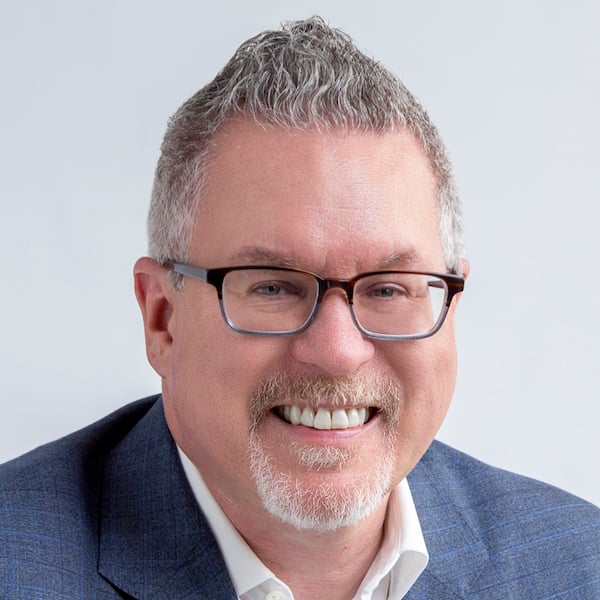
Written by Mark Graban
Mark Graban has served healthcare clients since 2005. Mark is internationally recognized as a leading author and speaker on Lean healthcare. His latest book is "The Mistakes That Make Us: Cultivating a Culture of Learning and Innovation."

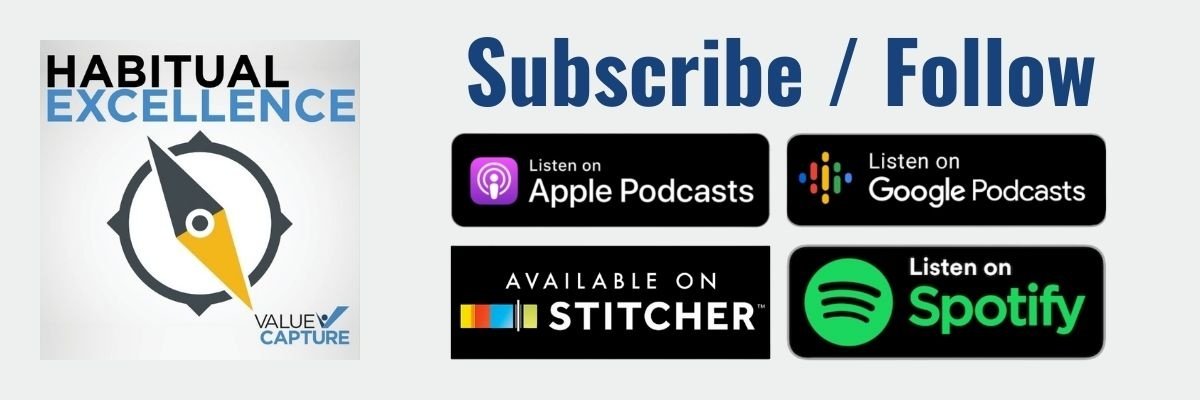
Submit a comment